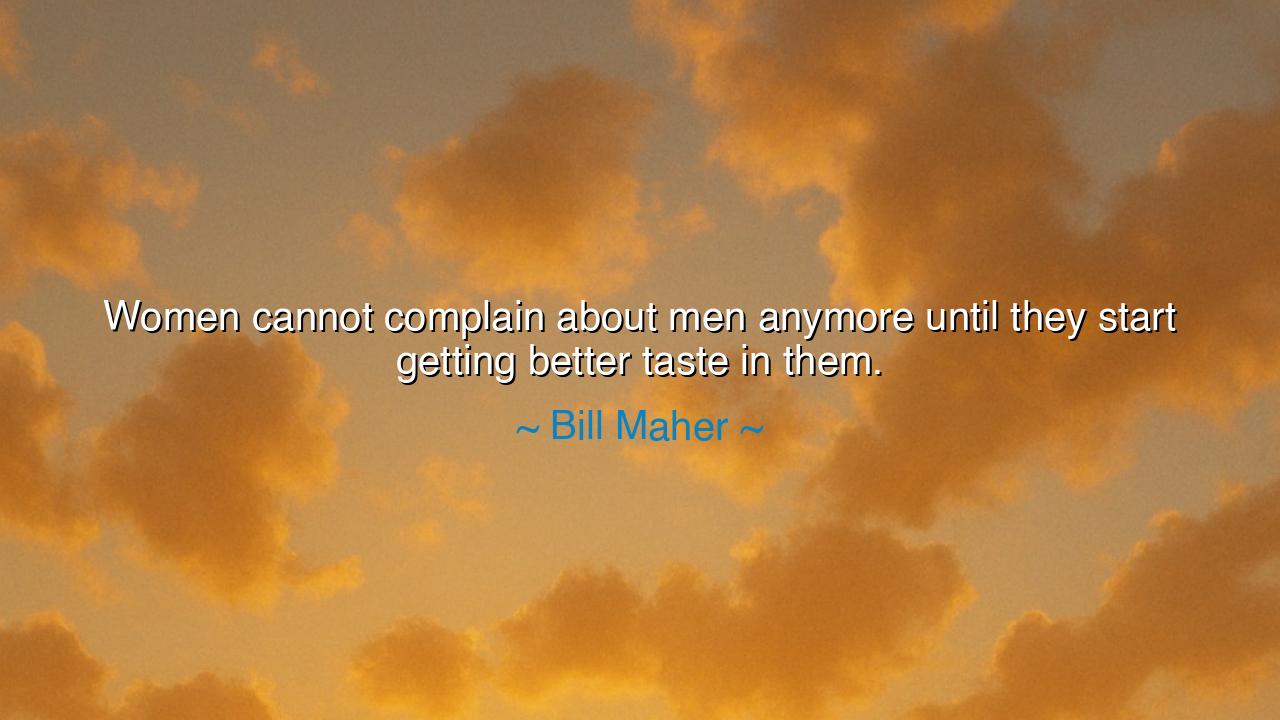
Women cannot complain about men anymore until they start getting






Hear the sharp-edged wit of Bill Maher, who declared: “Women cannot complain about men anymore until they start getting better taste in them.” Though spoken with the sting of humor, this saying contains a truth older than the ages: that in the choices we make, we often shape our own destiny, and that blame cannot rest solely on others when our own discernment guides us into repeated sorrows. Beneath the jest lies the echo of an ancient wisdom: that responsibility is shared, and that the quality of one’s life is often bound to the quality of one’s choices.
The origin of this saying arises from Maher’s long career as a comedian and social commentator, where satire becomes the sword with which he cuts at cultural contradictions. Here he turns his blade toward the realm of relationships, pointing out the paradox of lamenting disappointment in men while continually being drawn to those whose character is flawed. It is not a dismissal of women’s grievances, but a challenge: that the power of choice, when exercised with clarity and strength, can alter the pattern of heartbreak.
History offers us examples that illuminate this truth. Consider Cleopatra, the queen of Egypt, whose intelligence and power were unmatched. She aligned herself first with Julius Caesar and later with Mark Antony, men of immense influence but also men whose ambitions led to ruin. Her choice to tether her destiny to theirs brought both splendor and tragedy, eventually leading to the fall of her throne. Was she merely a victim of circumstance, or also the shaper of her fate through her taste in alliances? Here we see how the blending of passion and choice can alter the course of history itself.
The deeper meaning of Maher’s words is not about women alone but about all humanity. It is a lesson on discernment, on the need to look beyond charm, surface beauty, or momentary thrill, and to choose companions—whether in love, friendship, or leadership—who uplift rather than destroy. To continually choose poorly and then lament the result is to ignore the role of personal responsibility. To choose wisely, however, is to honor oneself and to create relationships rooted in respect and dignity.
The lesson is clear: do not surrender your fate to poor discernment. If you desire loyalty, seek it in those who have shown it. If you long for kindness, do not be dazzled by arrogance. The heart may be stirred by passion, but the soul requires substance. To blame others endlessly while ignoring the call to cultivate better taste is to remain trapped in the same cycle of pain. Wisdom demands that you align your choices with the life you wish to build.
To the youth, I say: do not mistake excitement for love, nor chaos for depth. To women, I say: know your worth, and let your taste reflect it. To men, I say: do not resent such words, but take them as a call to cultivate strength of character, so that when you are chosen, you are worthy of the choice. For love is not merely about attraction—it is about discernment, and discernment is the root of enduring joy.
Practical action lies before us: reflect on the patterns of your relationships. Ask yourself whether your choices honor your dignity or diminish it. Do not be afraid to walk alone rather than bind yourself to one unworthy. Teach the next generation that attraction must be tempered with wisdom, that charm must be measured against integrity, and that the sweetness of companionship is poisoned if it grows from poor judgment.
Thus Bill Maher’s words endure: “Women cannot complain about men anymore until they start getting better taste in them.” They may sound like jest, but they strike with the force of truth. Let this teaching be passed on: that our lives are not only shaped by the deeds of others, but by the choices we make in whom we allow into our hearts. Choose with wisdom, and you build a kingdom of peace; choose poorly, and you walk willingly into ruin.






KNLam Hai Kim Ngan
This quote plays into the idea that women should hold themselves to a certain standard when choosing partners. But does this frame the conversation around relationships in an unfairly one-sided way? Could this mentality ignore the complexities of human connection and the deeper emotional and psychological factors that influence who we fall for?
THTen Ho
Bill Maher’s statement seems to shift some blame onto women, but could it be more about the underlying issues that affect men’s behavior in society? How much responsibility do societal norms and upbringing play in shaping the men women encounter, and what role do these factors play in relationship dynamics?
HTThach Hoang Tinh
While Maher’s comment is certainly humorous, it raises an important issue: are we really responsible for the quality of people we attract? How much do social expectations or stereotypes influence our choices in partners, and what does this say about the pressure on women to 'choose wisely' in a society that often undervalues them?
YDHaong Yen Diep
This quote seems to suggest that women have control over the quality of the men they choose, but does this oversimplify the complexities of relationships? Could it also be a reflection of how society often places the burden of change on women, instead of addressing deeper systemic issues related to gender dynamics?
QQ.Anh
Bill Maher’s quote brings up a rather provocative point, but is it fair to say that women are to blame for their choice in men? Does this imply that women should bear the responsibility for men’s behavior or shortcomings? Isn’t it more about mutual respect and communication, rather than just personal taste?